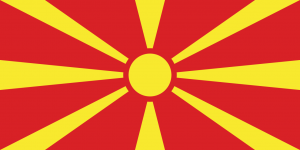Language/Macedonian/Grammar/Common-Conjunctions
Macedonian conjunctions are very important in building sentences, paragraphs, and expressing different ideas. Conjunctions are connecting words that connect words, phrases or clauses. In this lesson, we will learn the most common conjunctions used in Macedonian.
Coordinating Conjunctions
Coordinating conjunctions are used to join two or more items of equal syntactic importance within a sentence. In Macedonian, the most common coordinating conjunctions are:
И (And)
И (pronounced "ee") is used to join items or subjects together to indicate that they are in addition to each other or their relationship is a complementary one. It is equivalent to the English "and."
Examples:
| Macedonian | Pronunciation | English |
|---|---|---|
| Јас и ти | yas ee ti | I and you. |
| Сунцето и луна | sunseto ee luna | The sun and the moon. |
Но (But)
Но (pronounced "no") is used to join two contrasting ideas or sentences. It is equivalent to the English "but."
Examples:
| Macedonian | Pronunciation | English |
|---|---|---|
| Јас сум дома, но не ми е забавно | Yas sum doma, no ne mi e zabavno | I am at home, but I am not having fun. |
| Тој е богат, но не е среќен | Toj e bogat, no ne e srekjen | He is rich, but he is not happy. |
Или (Or)
Или (pronounced "ee-li") is used to present two or more alternatives, out of which one is valid. It is equivalent to the English "or."
Examples:
| Macedonian | Pronunciation | English |
|---|---|---|
| Дали сакаш пицца или паста? | Dali sakash pitsa ili pasta? | Do you want pizza or pasta? |
| Сакаш ли розова или сина маица? | Sakash li rozova ili sina maitsa? | Do you want a pink or blue shirt? |
Па (So)
Па (pronounced "pa") is used to indicate an effect in a sentence. It is equivalent to the English "so."
Examples:
| Macedonian | Pronunciation | English |
|---|---|---|
| Јас сум многу гладен, па треба да јадам | Yas sum mnogu gladen, pa treba da jadam | I am very hungry, so I need to eat. |
| Тој пее убаво, па сите го сакаат | Toj pee ubavo, pa site go sakat | He sings beautifully, so everyone likes him. |
А (But/And)
А (pronounced "a") is a conjunction that can be used as an equivalent for both "and" and "but" in English. It can be used when contrasting two ideas or adding ideas in succession.
Examples:
| Macedonian | Pronunciation | English |
|---|---|---|
| Тој е богат, а е сам | Toj e bogat, a e sam | He is rich, but he is alone. |
| Јас имам работа, а и време за хоби | Yas imam rabota, a i vreme za hobi | I have a job, and I have time for hobbies. |
Subordinating Conjunctions
Subordinating conjunctions introduce a subordinate clause that depends on the main clause. In Macedonian, the most common subordinating conjunctions are:
Дека (That)
Дека (pronounced "deka") is used to introduce a clause that further defines the information in the main clause. It is equivalent to the English "that."
Examples:
| Macedonian | Pronunciation | English |
|---|---|---|
| Јас верувам дека ќе дојдеш | Yas veruvam deka kje dojdesh | I believe that you will come. |
| Не знам дека каде си | Ne znam deka kade si | I don't know that you are. |
Зашто (Because)
Зашто (pronounced "zashto") is used to introduce a clause that explains the reason why something happened. It is equivalent to the English "because."
Examples:
| Macedonian | Pronunciation | English |
|---|---|---|
| Јас одирам кожа за мојата облека, зашто имам алергија на синтетика | Yas odiram koza za mojata odeka, zashto imam alergija na sintetika | I choose leather for my clothes, because I am allergic to synthetic materials. |
| Треба да јадеш здраво, зашто е добро за здравјето | Treba da jadesh zdravo, zashto e dobro za zdravjeto | You should eat healthy, because it is good for your health. |
Кога (When)
Кога (pronounced "koga") is used to introduce a clause that describes the time frame when an action happened. It is equivalent to the English "when."
Examples:
| Macedonian | Pronunciation | English |
|---|---|---|
| Јас бев на работа, кога дојде телефонски повик | Yas bev na rabota, koga dojde telefon-ski povik | I was at work, when I received a phone call. |
| Тој отиде да спие, кога му и беше најтешко | Toj otide da spie, koga mu i beshe najteshko | He went to sleep, when he was feeling the worst. |
Додека (While)
Додека (pronounced "dodeka") is used to introduce a clause that describes an action that is happening at the same time as another action. It is equivalent to the English "while."
Examples:
| Macedonian | Pronunciation | English |
|---|---|---|
| Тој јадеше, додека јас мислев за есенција | Toj jadeshe, dodeka yas mislev za esentsija | He was eating, while I was thinking about the essence. |
| Јас ќе учам, додека тој ќе гледа телевизија | Yas kje ucham, dodeka toj kje gleda televizija | I will study, while he will watch TV. |
Summary
In this lesson, we learned the most common coordination and subordination conjunctions used in Macedonian, such as "и" (and), "но" (but), "или" (or), "па" (so), "а" (but/and), "дека" (that), "зашто" (because), "кога" (when), and "додека" (while). It is important to practice using these conjunctions in order to build strong sentences and express ideas clearly in Macedonian.
Related Lessons
- Plurals
- Adjectives: Agreement and Comparatives
- Asking Questions
- Give your Opinion
- Adjectives
- Conditional Mood
- Questions
- Common Prepositions
- Negation
- How to Use Be

